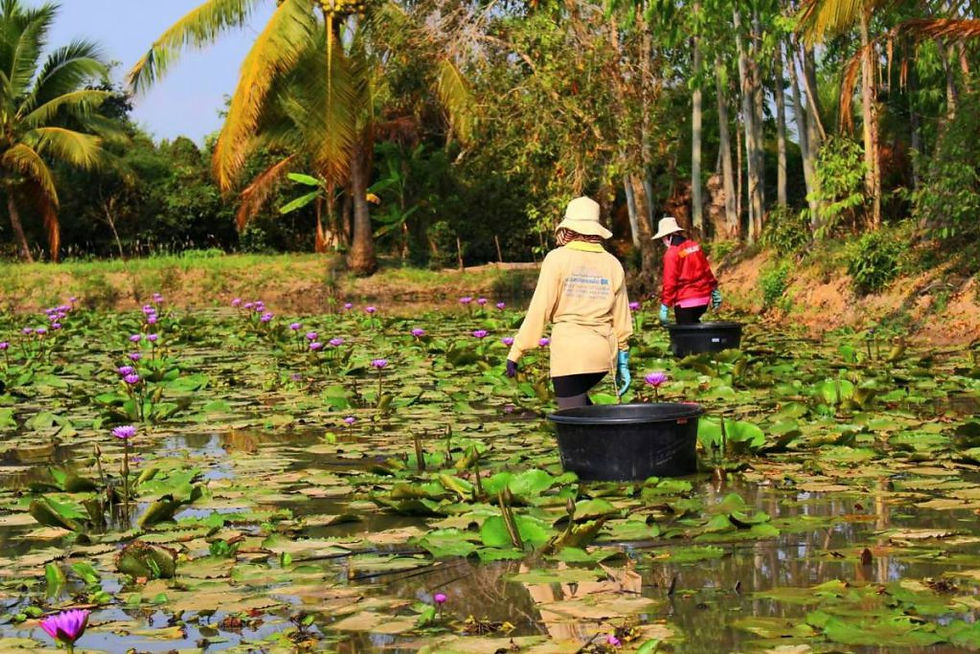Rose Geranium
- Dave

- May 14, 2023
- 2 min read
Rose Geranium
Botanical Name:
Pelargonium Capitatum
Common Name:
Rose Geranium
Family:
Geraniaceae
Parts Used:
Leaves and flowers
Native To:
South Africa
Harvesting Guidelines:
Rose geranium leaves and flowers are harvested when the plant is in full bloom, usually in the morning before the heat of the day.
Pelargonium capitatum, also known as rose-scented pelargonium, is a species of flowering plant native to South Africa, where it grows in the mountains of Cape Town. This plant has a long history of use by the Khoi San people for its medicinal properties. It was used to treat various ailments, such as coughs, colds, wounds, and digestive issues. (1)
In addition to its medicinal uses, Pelargonium capitatum has gained popularity in recent years in the field of aromatherapy. The essential oil extracted from the leaves and flowers of the plant is used in aromatherapy to promote relaxation, reduce stress and anxiety, and improve mood. It is also believed to have antimicrobial properties, which may help to fight off infections. (2)
Pelargonium capitatum is easy to grow and is a popular ornamental plant in gardens and on balconies due to its beautiful flowers and pleasant fragrance. The plant is often propagated by stem cuttings and can be grown indoors or outdoors. (3)
Overall, Pelargonium capitatum is a versatile plant with a rich history of use and a range of benefits for both physical and mental health. Its popularity in aromatherapy and as an ornamental plant make it a valuable addition to any garden or home. (4)
References:
"Pelargonium capitatum: Aromatic Geranium" by David Crow, in Floracopeia: https://www.floracopeia.com/Pelargonium-Capitatum-Aromatic-Geranium
"The Scent of Cape Town: Pelargoniums and the Fragrant History of South Africa" by Monique Simmonds and Mark Nesbitt, in Kew Magazine: https://www.kew.org/read-and-watch/the-scent-of-cape-town-pelargoniums-and-the-fragrant-history-of-south-africa
"Aromatic Geranium" by Sharon Falsetto, in The Aromatherapy Journal: https://www.alliance-aromatherapists.org/aromatic-geranium/
"Pelargoniums: History, Cultivation and Uses" by John Feltwell: https://www.amazon.com/Pelargoniums-History-Cultivation-John-Feltwell/dp/0881926356
Scientific Research:
"Chemical Composition, Antimicrobial and Antioxidant Activities of Essential Oils of Pelargonium capitatum and P. graveolens from Algeria" by Khaled Sekkoum et al. (2018) - This study analyzed the chemical composition, antimicrobial, and antioxidant activities of essential oils extracted from Pelargonium capitatum and Pelargonium graveolens. The results showed that P. capitatum oil had significant antioxidant and antimicrobial activities, making it a potential natural preservative and food additive. Link: https://www.ncbi.nlm.nih.gov/pmc/articles/PMC6134912/
"Biological Activity of the Essential Oil from Pelargonium capitatum Ait. on Selected Strains of Bacteria and Fungi of Medical Importance" by Renata Kazimierczak et al. (2019) - This study investigated the biological activity of the essential oil of P. capitatum against various bacteria and fungi. The results indicated that the oil had significant antimicrobial properties against some of the tested strains, making it a promising candidate for the development of new antimicrobial agents. Link: https://www.ncbi.nlm.nih.gov/pmc/articles/PMC7048093/
"In vitro evaluation of antioxidant activity and cytotoxicity of Pelargonium capitatum extracts" by Sihem Bendif et al. (2020) - This study examined the antioxidant activity and cytotoxicity of different extracts of P. capitatum using in vitro assays. The results showed that P. capitatum extracts exhibited strong antioxidant activity and low cytotoxicity, suggesting their potential use in the development of natural antioxidants and therapeutic agents. Link: https://www.ncbi.nlm.nih.gov/pmc/articles/PMC7484972/









